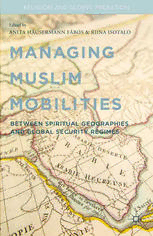Table Of ContentManaging Muslim Mobilities
RELIGION AND GLOBAL MIGRATIONS
Series Editors: Elena Fiddian-Qasmiyeh, Jennifer B. Saunders, and Susanna
Snyder
As the first series of its kind, Religion and Global Migrations will examine the
phenomenon of religion and migration from multiple disciplinary perspectives (e.g.,
historical, anthropological, sociological, ethical, and theological), from various
global locations (including the Americas, Europe, and Asia), and from a range of
religious traditions. Monographs and edited volumes in the series explore the inter-
sections of religion and migration from a variety of approaches, including studies of
shifting religious practices and ideas in sending and receiving communities, among
migrants, and also among those who interact with migrants in places of origin and
destination; public responses to migration such as religiously informed debates,
policies, and activism among migrants and non-migrants alike; gender dynamics
including shifts in gender roles and access to power in sending and receiving sites;
identity in relation to religion and migration that may include constructive, as well
as descriptive, scholarship; empire, from the ancient Mediterranean through the
height of European colonization to contemporary relationships between the devel-
oping and developed world, and the way it has profoundly affected the movement
of people and development of religions; and other topics connecting to the theme of
religion and global migrations.
Managing Muslim Mobilities: Between Spiritual Geographies and the
Global Security Regime
Edited by Anita H. Fábos and Riina Isotalo
Managing Muslim Mobilities
Between Spiritual Geographies and
the Global Security Regime
Edited by
Anita H. Fábos and Riina Isotalo
MANAGING MUSLIM MOBILITIES
Copyright © Anita H. Fábos and Riina Isotalo, 2014.
Softcover reprint of the hardcover 1st edition 2014 978-1-137-43486-9
All rights reserved.
First published in 2014 by
PALGRAVE MACMILLAN®
in the United States— a division of St. Martin’s Press LLC,
175 Fifth Avenue, New York, NY 10010.
Where this book is distributed in the UK, Europe and the rest of the world,
this is by Palgrave Macmillan, a division of Macmillan Publishers Limited,
registered in England, company number 785998, of Houndmills,
Basingstoke, Hampshire RG21 6XS.
Palgrave Macmillan is the global academic imprint of the above companies
and has companies and representatives throughout the world.
Palgrave® and Macmillan® are registered trademarks in the United States,
the United Kingdom, Europe and other countries.
ISBN 978-1-349-49308-1 ISBN 978-1-137-38641-0 (eBook)
DOI 10.1057/9781137386410
Library of Congress Cataloging-in-Publication Data is available from the
Library of Congress.
A catalogue record of the book is available from the British Library.
Design by Newgen Knowledge Works (P) Ltd., Chennai, India.
First edition: December 2014
10 9 8 7 6 5 4 3 2 1
To Maya and Musa
—A.H.F.
To my mother
—R.I.
This page intentionally left blank
Contents
Foreword: Geographies of Domination and Geographies
of Resistance ix
Leif Manger
Acknowledgments xix
Chapter 1 Introduction: Managing Muslim Mobilities—A
Conceptual Framework 1
Anita H. Fábos and Riina Isotalo
Section I Histories
Chapter 2 Iraqi Refugees in the Arab Muslim World: Ottoman
Legacies and Orientalist Presumptions 21
Dawn Chatty
Chapter 3 Spiritual Migration in the Context of Political
Change: The Bektashi Babas of Rumeli 39
Frances Trix
Section II Securitized Mobility, Politicized Presence
Chapter 4 Fear of Palestinization: Managing Refugees in the
Middle East 59
Riina Isotalo
Chapter 5 The Discourse of Guesthood: Forced Migrants
in Jordan 81
Oroub El-Abed
viii (cid:77) Contents
Section III Grasping the Transformation
Chapter 6 Between Ghurba and Umma: Mapping Sudanese
Muslim Moralities Across National and Islamic Space 103
Anita H. Fábos
Chapter 7 Accommodating Subversion and Social
Transformation: Afghan Refugee Women’s Clandestine
Educational Movement in Iran 129
Homa Hoodfar
Chapter 8 The Stuttgart Crescent: Muslim Material and
Spiritual Geographies in Germany 153
Petra Kuppinger
Section IV Conclusion
Chapter 9 Blurry Polarization—Muslim Mobilities
Reconfigured 173
Riina Isotalo and Anita H. Fábos
Bibliography 187
List of Contributors 207
Index 211
Foreword: Geographies of Domination
and Geographies of Resistance
Leif Manger
“Just as none of us is outside or beyond geography, none of us is
completely free from the struggle over geography. That struggle
is complex and interesting because it is not only about soldiers
and cannons but also about ideas, about forms, about images and
imaginings.” (Said, 1993: 37)
In the invitation to the American Anthropological Association session
in which the chapters of this book were presented, the organizers (and
editors of the book) asked for studies that will incorporate a historical
understanding of Muslim migrant and refugee mobility and settlement into
an anthropological analysis of contemporary management of population
movements by Muslim states between “spiritual geographies” that Muslims
relate to, and practices of security. A tall order, but with the generous invita-
tion from the editors to provide some reflections by way of a Foreword—so,
let me try.
Western Discourses on Space and Security
First, a focus on contemporary migration patterns seems to me to be impor-
tant. On the one hand, migration is a desired part of a capitalist global
economy, in order to meet labor needs. A degree of openness is also needed
to facilitate trade relations. On the other hand, migration that is a result of
displacement is increasingly seen by the global North as a security threat,
linked to a “war on terror.” Furthermore, trade is not only legal, it is also
illegal, and some types of trade has taken us into a “war on drugs.” Both

